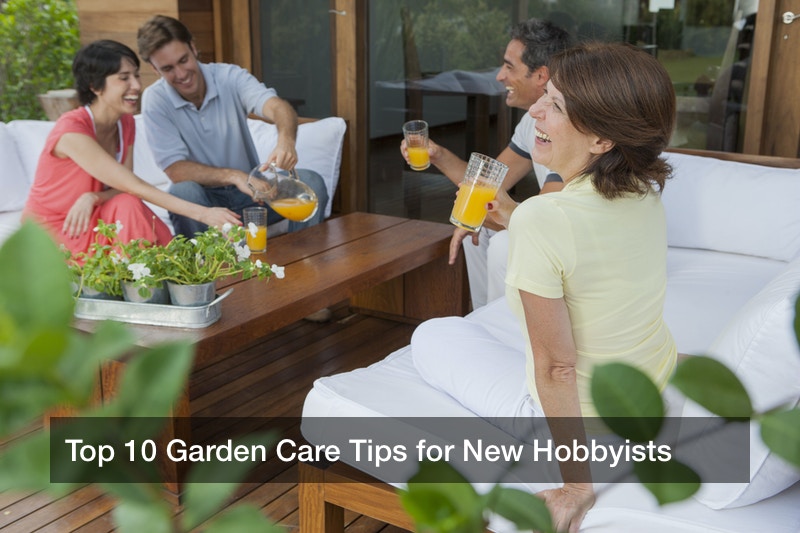
Gardening is a common hobby for people, and it’s picked up in popularity since COVID-19 quarantine began. As many as 35% of households garden and you may want to show off your green thumb and join them in the fun.
Gardening can be a relaxing and rewarding hobby, but it does come with a lot of responsibility. If you’re just starting out, it can seem overwhelming. However, there are steps you can take to own the process and take everything in stride. Here are 10 of the top garden care tips new hobbyists should know, and how they’ll help create a first garden to remember.
Tip 1: Decide What You Want to Plant
When looking up garden care tips, you should have some ideas on what you want to plant. Do you want to plant flowers? Vegetables? Fruit trees? It’s important to know what you want to plant before you make any plans for your garden.
There are pros and cons to planting certain seeds. If you decide to plant vegetables, you’ll get to enjoy fresh produce that you planted yourself. However, it does take a lot of time and commitment to growing a vegetable garden. Plus, if you plant food, you risk attracting animals to your home. If you plant flowers, you’ll get a beautiful garden that can add curb appeal to your home. However, flowers attract insects like bees to your yard. If you’re allergic to these insects, you could risk having an allergic reaction if you come in contact with them. If you decide to plant trees, you’ll get to enjoy the leisure of tree care and help the environment. However, you’ll have to keep up with tree maintenance regularly, which includes tree pruning.
Carefully decide what you want to plant and get to work. One of the best parts of gardening is that if you decide to change your mind about what to plant, you can always start over.
Tip 2: Set Up Your Garden Space

Once you decide what you want to plant, it’s time to set up your garden space. When researching garden care tips, make sure to look up how to properly set your space up. If your lawn is all grass, you’ll likely need to dig up the grass to make room for the garden. You’ll want to select a spot where your plants will get at least six hours of direct sunlight. It’ll also help to have your garden close to a water source.
Once the space is selected, the next step is to get the soil ready. Healthy soil should be crumbly, have plenty of organic matter in it, and the right pH level for your plants. Plants get their nutrients from soil, so if your soil isn’t healthy, then your plants won’t be healthy either. If you aren’t sure how healthy your soil is, you can always get it checked. If you need to improve your soil’s health, you can start by adding organic material in. This includes compost, dead leaves, and even coffee grounds.
Tip 3: Make Sure Your Space Is Pest-Free
One of the most important garden care tips is to set up your spot in a pest-free zone. Pests can cause serious damage to your garden if left to their own devices. These pests include beetles, aphids, and slugs. These pests can feed on your plants and suck the important nutrients out of them. These can leave your plants looking dull and unkempt, and it could even cause them to wilt and no longer grow.
Gardens can also attract larger pests, especially if you’re growing vegetables. These larger pests include opossums, moles, and mice. Small animal pests can dig up your garden, eat your plants, and even end up digging around in your garbage if the garden doesn’t cut it. If you have a pest problem, look up pest control companies in your area that can help. They can take care of your pest problems and help you prevent them from happening in the future.
You should also keep in mind that gardens may inadvertently attract pests into your home. Ants may be attracted to your garden, but they may want to explore your home after touring the garden. Keep an eye out for pests making their way into your home, especially if your garden is close to your home. If you do have an issue with ants, call someone who specializes in ant extermination to help you get rid of them as soon as possible.
Tip 4: Get to Mulching
One of the best garden care tips for new gardeners is to mulch your garden. Mulch is a layer of organic material that’s laid over your soil for a number of reasons. It helps keep moisture in the soil by absorbing some of the intense sunlight. It also helps regulate soil temperature and helps prevent weeds from growing. Adding a thin layer of mulch to the top of your soil can also help seeds grow faster, but be cautious. If you lay on the mulch too thick, it can actually prevent seeds from growing.

You can get mulch at a number of places, like a home improvement store or in the garden section of a local store. If you don’t want to buy mulch, you can make your own. You could use organic material like grass clippings, leaves, and tree bark to create homemade mulch. The organic material in mulch can also seep into the soil and help your plants grow, which is why some people opt to make their own mulch instead of buying it from the store.
Tip 5: Invest in the Right Tools
You can look up all the best garden care tips out there, but if they may be useless if you don’t have the right tools for gardening. As someone new to gardening, look up what tools you’ll need to grow your garden successfully. These tools include shears, wheelbarrows, digging spades, gloves, hoes, and a hose. If you don’t have the budget to buy all these tools at once, look into tool rental for gardening. There may be places where you can rent out your gardening tools for an afternoon. Another option is asking friends or family members who garden if you can borrow their tools.
Another tool you should invest in (if you don’t have one already) is a mower. Mowers can help keep your garden looking good by getting rid of the grass growing around it. You can even look for a mower package deal at a nearby store and save some money in the process.
Tip 6: Store Your Tools Properly
Once you have your gardening tools, the next step is to focus on storage. Where are you going to put your tools? If you have a shed in your backyard, you could store your gardening tools in there. The shed may be crowded, though. If you need more space in your shed, you could create shelves and mount them to the walls. Or, if you have a small arsenal of gardening tools, you could put them in buckets, put a few nails in the shed’s walls, and hang the buckets on the nails. If you want to take your storage up a notch, you could make a pegboard and mount it in your shed or garage. You can hang tools shears and spades on it.
If you have long-handled tools, like hoes and shovels, you’ll want to store them in the shed or garage. Make sure to store them safely, as they could fall on the floor and cause a safety hazard. If you’re storing them in the garage, try to keep them away from the wood garage door that leads to the house. If someone opens that door, a shovel or hoe could fall and cause someone to trip.
Tip 7: Keep an Eye On the Sunlight
One of the garden care tips that shouldn’t be overlooked is to keep an eye on the sunlight. Plants need sunlight in order to grow. Without proper sunlight exposure, they won’t make it. How much sunlight they need depends on what kind of plant they are, but on average, plants need at least six hours of direct sunlight each day. Some plants also thrive when they get some shade for three hours, so be sure to look up what amount of sunlight works best for your plants.

If you’re looking for a bonus project, you would work on incorporating solar energy into your garden. You could use the solar energy to power lights, a fountain, or a pump in the garden. More people are using solar energy for farms and for their gardens, as it’s a cleaner energy source. Once you have your garden set up, you can look into this additional project and see what you can do with it.
Tip 8: Watch Your Watering Schedule
The amount of water your plants need will also depend on what kind of plant they are, so it’s crucial you pay attention to your watering schedule. It’s recommended you water your plants in the early morning or evening hours, as the cooler temperatures won’t cause the water to evaporate so quickly. You also want to avoid over-watering and under-watering your garden, as both situations could harm your garden’s health. It’s recommended that you feel your soil before watering your garden. If the soil feels bone-dry, then you know your garden needs watering. If it’s moist, then your garden is likely all set on water for the time being. Keep in mind that bigger plants may need more water, so if you have a mix of plants in your garden, be sure they’re all getting the water they need.
If you’re nervous about over-watering or under-watering your plants, you could set up an automated irrigation system that takes care of the watering process for you. You can set it to how much or how little you want your garden to be watered. Keep an eye on it for the first couple of days to make sure it works properly, though.
Tip 9: Know the Right Time to Plant
Of all the garden care tips you find, this one may be one of the most crucial to remember. There’s a right time to plant your garden, and if you plant it at the right time, your garden is more likely to thrive. If you’re planting vegetables, you can start seeding six to eight weeks before the last spring frost date. There are crops, such as lettuce and carrots, that grow well in the cooler spring weather. Once those are all set, you can plant warmer weather crops like peppers and tomatoes.
If you’re planting flowers, look at a flower calendar to get an idea of what time of year is best to plant a specific flower. Some flowers thrive in early winter, while others, such as petunias, grow better in the summer. Research when your crops plant best and plant them at that time to better ensure their health.
Tip 10: Look For Signs of Damage
One of the best garden care tips to remember is to look for signs of damage. If you notice your plants are wilting, look discolored, or that the soil isn’t holding water, your garden could be sick. We monitor our own health care closely, and every new gardener should monitor their garden’s health closely too.

Something you can do to improve your garden’s health is add in more healthy mulch and compost to the soil. The more nutrients the soil has, the better. If your garden is slightly damaged, don’t beat yourself up over it. You’re new to gardening, and the more you do it, the better you’ll get at it.
With these garden care tips, you’ll be on your way to planting a lavish garden you can show off to your friends and family. You’ll also pick up a rewarding hobby you can do for a lifetime. Starting a garden may seem difficult at first, but before you know it, it’ll be like second nature to you. Now, get out there and get started on creating your first garden.




